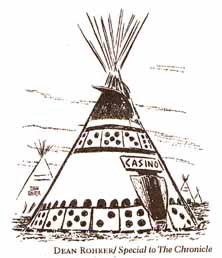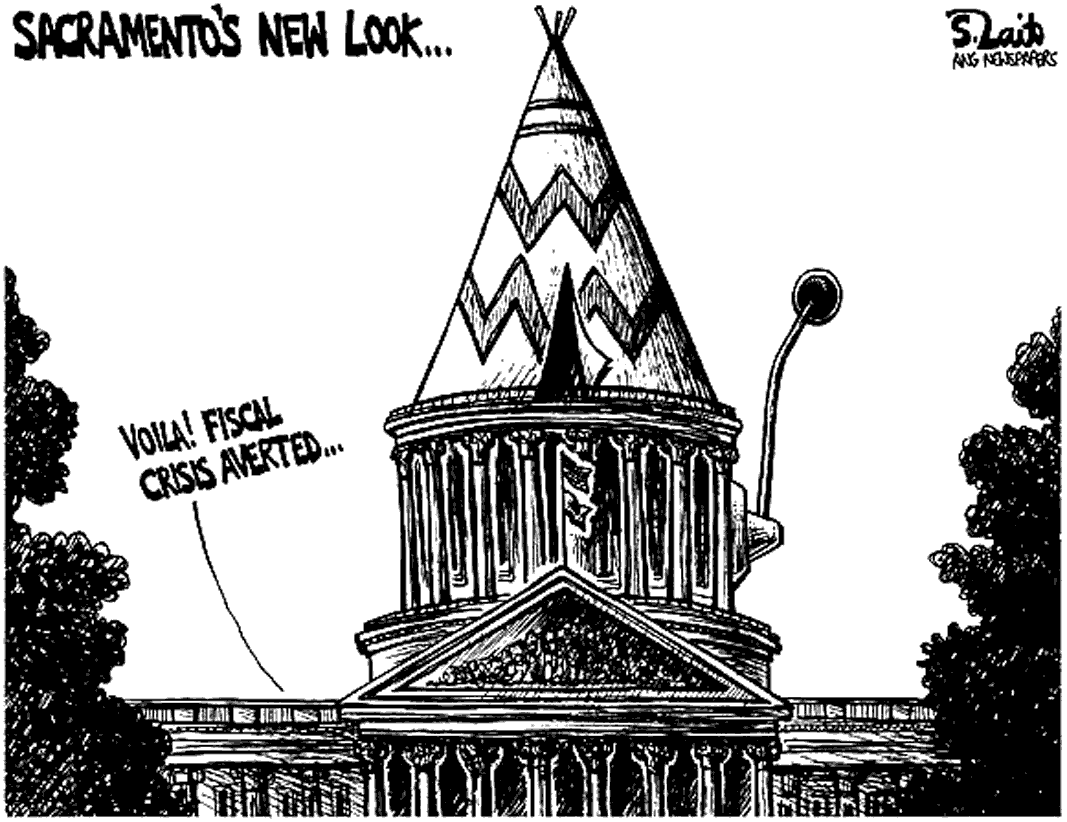 Another Stereotype of the Month entry:
Another Stereotype of the Month entry:
 Another Stereotype of the Month entry:
Another Stereotype of the Month entry:
Sing a song of sorrow, governor
Jill Stewart
Friday, September 30, 2005
GOV. ARNOLD Schwarzenegger has launched his Fall Offensive to turn the polls around, pass key reforms and regain momentum. The stakes are high and both sides are spending every dime to influence voter and pundit opinion. But the governor would be wise to set aside his recent tactics and learn instead from the California tribal experience. The strange journey taken by California's Indian tribes is a profound lesson about how far and fast the popular can fall in the realm of public opinion.
In 2000, the tribes were granted permission to erect casinos in California, thanks to voters driven in large part by guilt over past treatment of Native Americans. The tribes began reaping vast profits and now rival Las Vegas for income. A monthly income of $30,000 for every man, woman and child in a gaming tribe is no longer big news.
But the tribes earned the enmity of California voters by getting greedy. They squabbled to eject members from tribes so the remaining members wouldn't have to share. Battles erupted over bloodlines; some families dug up grandma to provide ancestral DNA.
Worse, the tribes abandoned their campaign promise of casinos only on "Indian land." Today, "Indian land" is any land the staggeringly rich gaming tribes can buy with acquiescence from politicians.
Schwarzenegger is now mired in the same situation that tarred the tribes' reputation, even though he has accomplished more in two years than former Gov. Gray Davis did in five (workers comp reform, budget reductions, slashing the car tax, killing driver's licenses for illegal immigrants, stimulating private-sector job growth, vetoing terrible laws passed by the Legislature). Despite this, Schwarzenegger's incessant fundraising evokes the same greed we saw from the tribes. He also plays into the hands of journalists engaged in the sort of blatant bias I've come to expect when an imperfect politician is also a Republican.
Again, look to the tribes. They made the same basic mistakes. In 2003 and again in 2004, the tribes assumed the public wouldn't care about the slime factor in massive campaign donating. After all, the tribes were popular (and, by God, they were owed). In 2003, the tribes poured millions into electing Lt. Gov. Cruz Bustamante as governor. But instead of getting their pro-casino man elected, the tribes were repudiated by voters, who saw Bustamante as the tribes' stooge. Then, in 2004, normally bighearted California voters stood in line to vote against further acquiescence to Indian gaming, as Proposition 70 went down to big defeat.
Not surprisingly, money and greed are also why we need reform. California's deficit, lingering at several billion dollars per year, was caused in large part by insatiable California government unions, who control the Legislature like floppy puppets on Sesame Street. Government unions, with their huge lobbying offices in Sacramento, hammered the Legislature into backing billions of dollars in unaffordable spending programs that — surprise, surprise — employ hordes of new union workers. Every time a program grows, so does the size and power of a union. Who cares if the program even works?
With Schwarzenegger in the doghouse just like the tribes, what's a governor to do?
Jonathan Wilcox, adjunct professor at USC's Annenberg School for Communications and a consultant to U.S. Rep. Darrell Issa, R-Vista (San Diego County), who launched the recall election by bankrolling the recall petition, has given me spot-on predictions of how the governor would stumble this year. Now he says Schwarzenegger needs a powerful theme "that comes more from sorrow than from anger. ... He has to fight on the proposition that we the people of California can fight the system, and he has to convince the people that they — not him, or his star power or his money — but only they can change California."
Instead, Schwarzenegger repeats his awful, singsong speech on special interests. I tune him out — and I am into politics. It's time the governor considered the intriguing idea of the "sorrow" theme. Even the word perks up my interest. "For the next two weeks," Wilcox suggests, "the governor should grab his veto pen and take it on the road while he vetoes bad laws. To bring the enormous problems of Sacramento to voters, who he is asking to make this enormous leap ... he should veto the job-killer bills while in the Central Valley and Southern California, and he should veto the bills that frustrate home-building while in the Inland Empire. And when he vetoes the education bills — well, he can go almost anywhere in the state to make that point."
Essentially, Wilcox is suggesting that the governor abandon his annoying chants and start giving intelligent voters a detailed picture that directly involves them. Unlike the tribes, the governor isn't in it personally for money. But by the same token, voters are having trouble seeing true reform — amid all those piles of cash.
Jill Stewart is a print, radio and television commentator on California politics. Her Web site is www.jillstewart.net.

Rob's reply
>> A monthly income of $30,000 for every man, woman and child in a gaming tribe is no longer big news. <<
It isn't? Well, it's still rare, even if (Stewart thinks) it isn't big news. Many tribes don't have any per capita payments, and those that do usually pay much less. $30,000/mo. is about the most any tribe pays, not the average or minimum.
>> But the tribes earned the enmity of California voters by getting greedy. <<
In Stewart's opinion, maybe. The tribes' failure to pass recent propositions doesn't mean the public dislikes them. In fact, surveys show the public still solidly backs Indian gaming.
>> They squabbled to eject members from tribes so the remaining members wouldn't have to share. Battles erupted over bloodlines; some families dug up grandma to provide ancestral DNA. <<
A few tribes ejected members. That's a few out of the 100-plus tribes in the state. It's not "they" as in all of them.
Tribes rarely if ever reveal the reasons they disenroll members. The disenrollees claim it's because the tribes don't want to share their casino revenues. This may be true, but there's no proof of it. Another possibility is that one faction may disenroll another faction to settle an old score. Some tribes may even disenroll members for legitimate reasons: because non-Indians wrongly got on the tribal rolls somehow.
Stewart doesn't explain her comments or discuss the alternatives, which makes her rant stereotypical. She castigates all tribes for the actions of a few.
>> Worse, the tribes abandoned their campaign promise of casinos only on "Indian land." <<
Again, "the tribes" haven't done any such thing. A few tribes have tried to open casinos on non-Indian land. They've generally done this because they don't have any land, not because they're greedy. So far, this so-called "reservation shopping" has had little success.
>> Today, "Indian land" is any land the staggeringly rich gaming tribes can buy with acquiescence from politicians. <<
Again, a gross distortion of what's actually happening. As Stewart evidently doesn't understand, the definition of "Indian land" has always been expansive. Tribes have always sought to regain their lost land by taking it into trust. Reservations have occasionally grown through this process for 100-plus years—long before gaming became an issue.
Stewart is flatly wrong when she asserts that rich tribes are buying land to build casinos. Ironically, it's usually the poor tribes who seek off-reservation casinos, not the rich ones. And they're doing it by trying to get land in their historic territory taken into trust, not by "buying" their way to riches.
Again, that's because they don't have a land base already. And that's because their population was devastated and their land stolen before the government could grant them reservations. Which explains why tribes have sought more land for 100-plus years.
>> Again, look to the tribes. They made the same basic mistakes. In 2003 and again in 2004, the tribes assumed the public wouldn't care about the slime factor in massive campaign donating. After all, the tribes were popular (and, by God, they were owed). In 2003, the tribes poured millions into electing Lt. Gov. Cruz Bustamante as governor. But instead of getting their pro-casino man elected, the tribes were repudiated by voters, who saw Bustamante as the tribes' stooge. <<
Again, look at Stewart's blatant bias. One tribe, not "the tribes," poured millions into Bustamante's campaigns. Other tribes criticized this ill-considered action. But because each tribe is sovereign, they couldn't do much about it.
>> But instead of getting their pro-casino man elected, the tribes were repudiated by voters, who saw Bustamante as the tribes' stooge. <<
Yeah, people saw Bustamante this way because of the stereotypical "reporting" of people like Stewart.
>> Then, in 2004, normally bighearted California voters stood in line to vote against further acquiescence to Indian gaming, as Proposition 70 went down to big defeat. <<
They also stood in line to vote against Proposition 66, which would've penalized the tribes severely and opened gaming to several non-Indian operators. The 2004 election offered mixed results for Indian gaming, not a resounding defeat.
>> Unlike the tribes, the governor isn't in it personally for money. <<
Hah! Is that why Schwarzenegger signed a deal to profit from body-builder magazines while vetoing legislation they opposed?
If Arnold isn't in it for the money, he's in it for the fame and glory. There's no evidence he cares about the woes of working people—as shown by his attacks on nurses, teachers, and fire fighters.
Related links
Rich Indians
Greedy Indians
Have gaming tribes bought California for $120 million? No
The facts about Indian gaming
|
. . . |

|
All material © copyright its original owners, except where noted.
Original text and pictures © copyright 2007 by Robert Schmidt.
Copyrighted material is posted under the Fair Use provision of the Copyright Act,
which allows copying for nonprofit educational uses including criticism and commentary.
Comments sent to the publisher become the property of Blue Corn Comics
and may be used in other postings without permission.